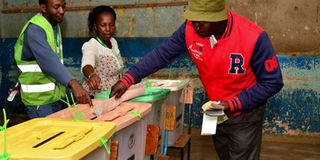Vote tallies showed signs of large-scale fraud: US expert

A voter casts his ballot at Central Primary School polling centre in Kitui Central constituency on August 8, 2017. In the election, Mr Kenyatta was said to have received about 1.3 million more votes than his main opponent, Raila Odinga. PHOTO | FRANCIS NDERITU | NATION MEDIA GROUP
What you need to know:
- Prof Mebane has developed an "election forensics toolkit" that applies diagnostic tools to voting data.
- He expressed optimism about the commission's ability to function competently in the election rerun.
NEW YORK
A US expert in "election forensics" says his statistical models suggest that large-scale fraud may have occurred in the vote tabulations for the August 8 presidential election.
The findings by University of Michigan political scientist Walter Mebane appear to contradict claims by Independent Electoral and Boundaries Commission chairman Wafula Chebukati that the voting process itself was not tainted.
"The focus of the decision is in the transmission of presidential result," Mr Chebukati said on Friday in regard to the Supreme Court ruling nullifying the announced outcome of the election.
"Therefore, there were no aspersions on the voting and the counting of the votes, and therefore the will of the Kenyan people was fully respected in this respect," Mr Chebukati declared.
POLLING STATIONS
But two statistical models used in Prof Mebane's analysis detected "anomalies" affecting a total of 548,352 of the roughly 15 million votes counted in the presidential election.
These possible indicators of fraud were present at polling stations throughout the country, Prof Mebane said in interviews with the Nation on Thursday and Friday.
"There was no sign of manipulation in voter turnout numbers," he noted.
"But the vote counts look anomalous on every basis we use."
EVIDENCE
Prof Mebane acknowledged that even if all 548,352 suspicious votes were in fact fraudulently counted in favour of President Uhuru Kenyatta, that number would still not be sufficient to overturn the announced result of the election.
Mr Kenyatta was said to have received about 1.3 million more votes than his main opponent, Raila Odinga.
However, Prof Mebane commented in an interview prior to Friday's Supreme Court ruling that Mr Odinga's allegations of vote fraud "appear to be supported by evidence".
INTEGRITY
The analysis carried out by the specialist in election integrity was based on a sifting of data from IEBC websites on August 18 and August 23.
Prof Mebane said he assessed only electronic vote tallies, not paper ballots.
He was not paid for his review of the vote tabulations, Prof Mebane said, who described himself as "100 percent American" with no connection to Kenya or any other country in East Africa.
The analysis was undertaken on a voluntary basis through his involvement in the US-based Election Verification Network, Prof Mebane added.
Several academics are affiliated with that NGO that was established last year with the aim of determining whether the results of elections are accurately reported in the US and other countries.
TOOLKIT
Prof Mebane has developed an "election forensics toolkit" that applies diagnostic tools to voting data.
He has used these statistical methodologies in elections in a dozen countries, including the 2013 presidential contest in Kenya.
A paper he wrote about that analysis said a statistical model shows "fraudulent activities that benefit TNA [The National Alliance headed by Uhuru Kenyatta] occur extensively in the Kenya 2013 presidential election".
RERUN
Prof Mebane declined to comment on what his findings about the 2017 election may suggest regarding the IEBC's performance.
He expressed optimism about the commission's ability to function competently in the election rerun.
"It seems possible with an infusion of resources that they should be able to do a lot better," Prof Mebane said on Friday following the Supreme Court ruling.





